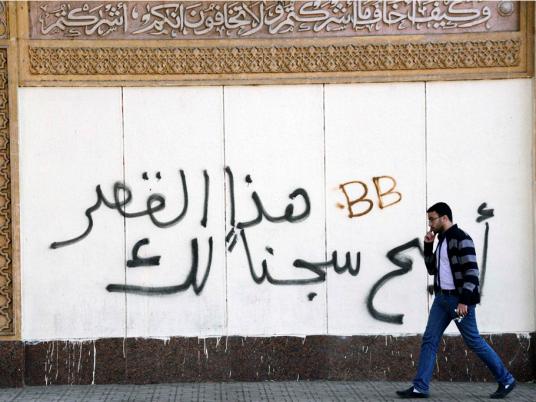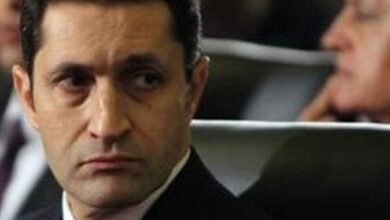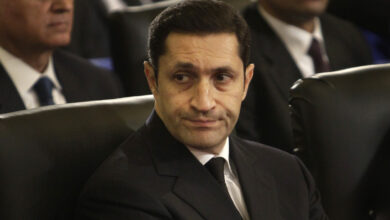
The commemoration of the second anniversary of Hosni Mubarak’s abdication in Egypt was centered around calls for the current president to step down, in a scene indicative of the tough time ahead for authorities.
Tens were injured and others reportedly arrested, after peaceful protest marches turned into violent clashes between protesters and Central Security Forces outside the Ettehadiya Presidential Palace on Monday night. Around 10,000 angry protesters marching from downtown Cairo, Tahrir Square and Nasr City, descended upon Mohamed Morsy’s presidential palace in Heliopolis to commemorate Mubarak’s toppling — and demanded the abdication of the new regime.
Thousands of protesters chanted slogans reminiscent of the 2011 uprising between 25 January and 11 February 2011, indicating that the state of revolution has not stopped. “The people demand the downfall of the regime” and “Irhal” (Arabic for "leave") were among the chants. However, newer slogans directed against Morsy’s regime were also chanted including: “Down with the rule of the guide” and “sell the revolution, sell. Sell the revolution Badie” in reference to Morsy's Muslim Brotherhood’s Supreme Guide Mohamed Badie.
Amidst the choking clouds of tear gas, angry protesters also chanted “fuck you Morsy” and “the Interior [Ministry] are thugs.” Others spray-painted messages of dissent such as “Morsy is a murderer” on his palace walls, and other buildings along Merghani Street where the palace is located.
Clashes erupted after a small group of youth moved to dismantle barbed-wire fences surrounding the palace’s main gate. Security forces within the palace used water cannons to disperse all protesters away from the main gate, after a couple of protesters had partially set it on fire. Rocks were then hurled over the palace walls, and shortly afterwards six armored riot police trucks were deployed with hundreds of CSF troops behind them.
Volleys of tear gas came raining down upon the protesters — violent and non-violent, alike — pushing all away from the palace’s walls. The now famous Black Bloc protesters built a makeshift barricade on the street outside the palace, while hurling tear-gas canisters back at the CSF, along with rocks, glass bottles, Molotovs, and fireworks.
Yet amidst the violent chaos, there were politics in the form of grievances, demands and propositions.
“We demand the downfall of the entire regime, especially Morsy. He’s proven time and time again that he is a liar. Morsy never sticks to the promises he made to the Egyptian people,” said protester Gamal Ibrahim. “We’ve seen that none of those responsible for the killings of protesters have been brought to justice, while more protesters are being killed every day across the country, with others being abused and tortured."
Ibrahim went on to say that Morsy lied when he said that he would be a president representing all Egyptian people, and that a new constitution would be issued to protect the rights of all Egyptians.
“Instead we have a dictator serving only the interests of his Brotherhood, and sponsoring a shameful constitution to protect his own direct interests and those of his society,” he said. Ibrahim recommended the formation of an interim “national coalition government” until new presidential elections could be held.
Besides the call for the downfall of Morsy's administration, a more moderate demand was the resignation of Prime Minister Hesham Qandil.
Sherif al-Masry told Egypt Independent, “I travelled today from Beni Suef (about 120 kilometers south of Cairo) to demand the resignation and impeachment of Prime Minister Qandil along with his cabinet.”
“Qandil is an animal who understands nothing. He talks of women’s dirty breasts causing diarrhea amongst babies while our country and its economy are collapsing,” he said referring to Qandil's recent controversial statements about hygiene an sanitation.
Referring to Qandil’s former position as minister of irrigation and water resources, Masry claimed that “he should just talk about irrigation, that’s the only thing he knows. Leave the government to those who know how to govern.”
Masry clarified, “I’m not here to protest against President Morsy. He is a decent man, but his ministers — especially Qandil — are incompetent fools. If he leaves them in place then country will surely collapse from mismanagement.”
Politics in the midst of the violence were not only manifested in the anti-regime demands, but also in resentment of the political class, including the opposition.
Leading members of the opposition coalition, the National Salvation Front, were noticeably missing from the protest at the palace. Even within the NSF there is disagreement regarding their opposition toward the ruling regime, with some demanding Morsy’s abdication, while others calling only for ministerial shuffles and reforms.
A middle-aged protester, Fathy Mahrous, noted that “Egypt’s revolutionary youth are far more active and fearless in their demands for justice than the opposition politicians and party chiefs.
“When it comes to their basic rights, even the common simple folks have grown fearless and outspoken since the revolution,” added Mahrous. He explained “people aren’t afraid of authority figures anymore. They are willing to confront the police on the street, as you can see. They even curse and assault judges in their courts.”
Mahrous concluded “Morsy will not be able to rule Egypt with an iron fist like Mubarak did before him. The people are no longer willing to put up with such subjugation.”
Well into the middle of the night, and two years into the toppling of Mubarak, hundreds of protesters remained in the palace, an area previously inaccessible for protests, at a moment of the revolution many believe is critical. In a perfect act of commemoration, they chanted, “Hey interior ministry, what do you think you’re doing? Did you forget about 25 January?"




